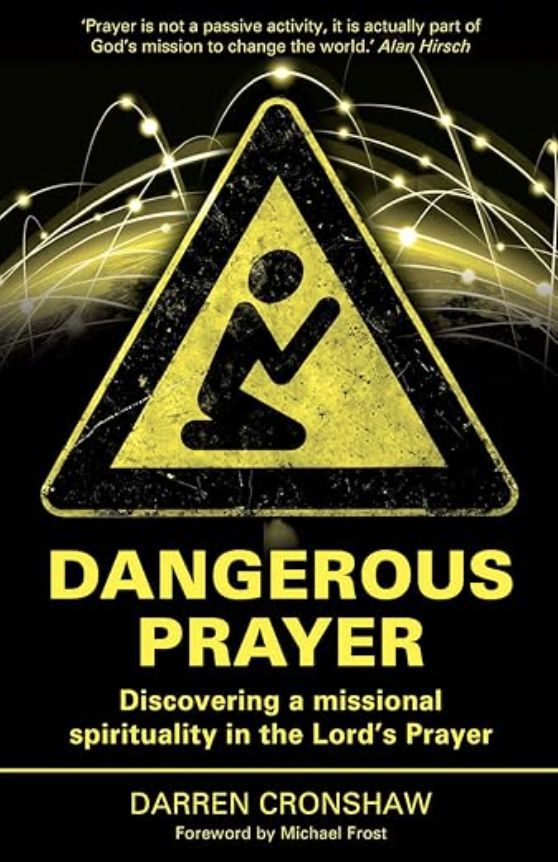Book Review: Dangerous Prayer: Discovering a Missional Spirituality in the Lord’s Prayer
Friday, 27 September 2024
| Tricia Mayne

Dangerous Prayer: Discovering a Missional Spirituality in the Lord’s Prayer
By Darren Cronshaw
(Milton Keynes, UK: Paternoster, 2017)
Dangerous? Why?
Because it comes with risk. It invites God – all-sovereign and entirely unpredictable – into our human lives. It shapes our hearts and minds to be more like those of God, in the process stripping us of our delusions, our disordered attachments and our excuses. And in this way it fits us to be part of the mission of God to our broken world.
That, at least, is Darren Cronshaw’s take on the Lord’s Prayer. He is someone who lives a life in mission (as a Baptist pastor and missiologist), and here he brings the fruit of his reflection on his work and his prayer (two sides of the same coin) to share with the wider Church.
Dangerous Prayer opens with Leunig’s prayer:
God help us to change. To change ourselves and to change our world. To know the need for it. To deal with the pain of it. To feel the joy of it. To undertake the journey without understanding the destination. The art of gentle revolution. Amen.
And Dangerous Prayer aims to equip us to do just that; to be provoked to change – ourselves and the world. To open our eyes to the necessity of change. To inspire us to transcend the grief of it. And to have a hope that points us firmly to joy, even while experiencing a work in progress.
Working through the Lord’s Prayer phrase by phrase, Cronshaw invites us to look at it with fresh eyes; to see the implications of this prayer for how we understand God’s character and mission and our place within that mission. The chapter on ‘The Subversive Justice of “Your kingdom come”’, in particular, offers an inspiring vision of transformation.
Cronshaw quotes Buechner:
“‘Thy kingdom come…on earth’ is what we are saying.” And if that were suddenly to happen, what then? What would stand and what would fall? Who would be welcome and who would be thrown the Hell out? Which if any of our most precious visions of what God is and of what human beings are would prove to be more or less on the mark, and which would turn out to be phony as three-dollar bills? ... To speak these words is to invite the tiger out of the cage, to unleash a power that makes atomic power look like a warm breeze.
The only reason we can invite the tiger out of the cage is because we can trust its purpose, its mission. We can trust the intention of the power that we ask to be unleashed on the world; a purpose and intention that has the good of all creation in view. This vision of cosmic good is being furthered by the reign of God, or as Cronshaw (not a monarchist) would have it, the dream of God, which we are invited to dream (and work for) with God.
‘This is no longer the Lord’s Prayer’, Cronshaw writes. ‘They were Jesus’ words, but he handed them over to his disciples, and the prayer became “the disciples’ prayer”. But it has become “your prayer” as Jesus’ body and the church prays it. It is also “the missional prayer” to pray in radical ways that change our world.’ Liturgists might wish that Cronshaw had expanded on his work to consider the missional implications of the Lord’s Prayer in its liturgical contexts, but perhaps that work can be taken up by another author.
The value of this book is as an integrative work; the insights presented are largely not original to Cronshaw, but rather, drawing heavily on a wide variety of sources – from personal anecdotes, theological works and pop culture – he presents a clear and consistent take on what the Lord’s Prayer is and does (or at least could be and do, if we pray it with that intention). In that sense, the work feels very authentic; its plea for a ‘missional spirituality’ is heartfelt and clearly the result of many years of praying, working and reading with particular driving questions in mind.
The book is easy to read, and the discussion questions at the end of each chapter are particularly helpful. This would be good material for a study group, perhaps as a way of introducing these concepts about mission to a congregation for the first time through a familiar approach – a prayer already well-known and well-loved. For those who already have a well-established foundation in understanding mission, the extensive references and bibliography invite deeper exploration of particular concepts.
Tricia Mayne Was born in 1933 at Concord, Sydney. She attended primary school at Ermington and secondary school at Parramatta, and went to Business College in Sydney. Her childhood sexual abuse (including by her two brothers and sister) and later by an Anglican clergyman prompted her to inform the Sydney Diocese that it had failed to produce a protocol addressing sexual misconduct.